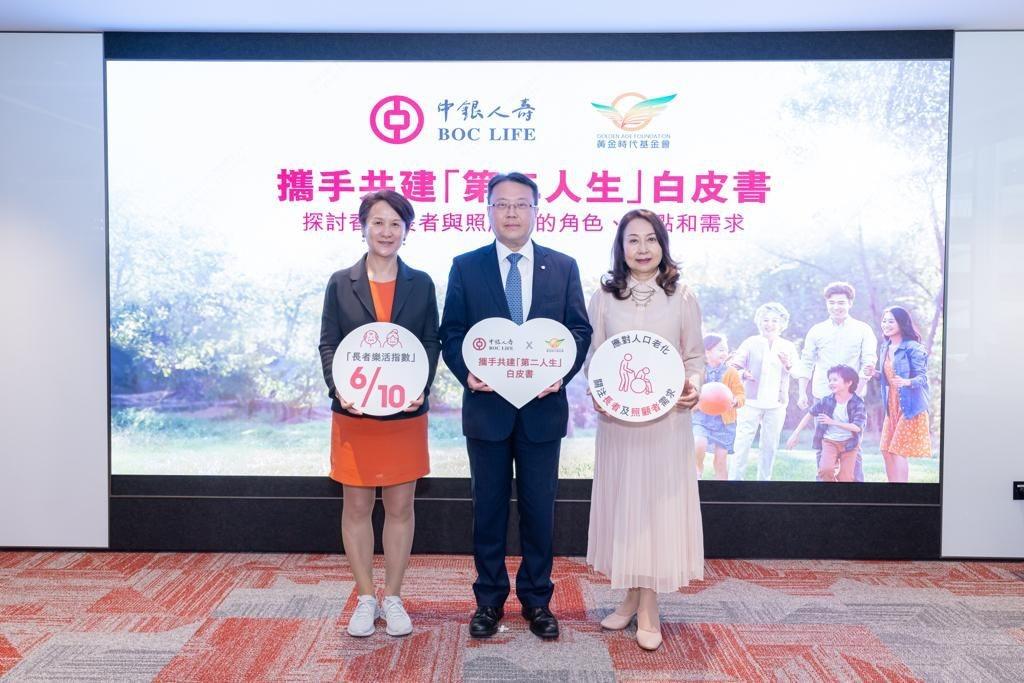 Wilson Tang (center), chief executive of BOC Life; Rebecca Choy Yung (right), founder and chairman of Golden Age Foundation; and Vivian Lou, director of the Sau Po Centre on Ageing at the University of Hong Kong, pose for photo during the presentation of the "Ageing Together" White Paper on Aug 8, 2023. (PHOTO PROVIDED TO CHINA DAILY)
Wilson Tang (center), chief executive of BOC Life; Rebecca Choy Yung (right), founder and chairman of Golden Age Foundation; and Vivian Lou, director of the Sau Po Centre on Ageing at the University of Hong Kong, pose for photo during the presentation of the "Ageing Together" White Paper on Aug 8, 2023. (PHOTO PROVIDED TO CHINA DAILY)
As Hong Kong becomes a “super-aged society” with an ongoing increase in its elderly population and the world’s highest average life expectancy, caregivers and the elderly both deserve sufficient attention and care, and the former should plan for their own and their parents’ retirement early on, a white paper jointly released by BOC Life and Golden Age Foundation on Tuesday recommended.
BOC Life conducted a survey covering 952 retirees and caregivers from middle-class or wealthier families for a white paper, Ageing Together.
Based on the survey results, the research team introduced an “Ageing Well Index” comprised of four major aspects — health, financial situation, family and relationships, and community support — which reflect the current satisfaction levels of the elderly.
Rebecca Choy Yung, founder and chairman of Golden Age Foundation, said that to address the challenges posed by an aging population, the business sector should harness its business acumen and strategic thinking to cater to the evolving needs of the middle-aged and elderly population, contributing to social welfare and shared value
The index scores six out of 10, with lower levels of satisfaction observed in the areas of health and community support. Despite regular body checkups, more than 90 percent of those surveyed expressed concerns about serious health risks.
ALSO READ: HK caregivers must have more support
According to the survey, 81 percent of the interviewed retirees are satisfied with their current state, while 63 percent of caregivers believe that their retired parents are content with their present situation. For caregivers taking care of elderly individuals aged 80 and older, this figure drops to 46 percent.
The survey indicates that as the elderly age, the disparity in perceived life satisfaction between seniors and their caregivers gradually widens.
“We can jointly develop the retirement services in Hong Kong, transform the elderly care ecosystem, and achieve synergy for the overall benefit of seniors, family caregivers, and the entire industry,” said Wilson Tang, chief executive of BOC Life.
From a financial standpoint, while nearly three-quarters of surveyed seniors expressed contentment with their financial arrangements, they still harbor concerns over their finances. Approximately 40 percent of respondents indicate they have not engaged in any financial planning for their retirement, highlighting insufficient preparation for future expenses.
ALSO READ: HK to hire 1,000 caregivers from mainland
Rebecca Choy Yung, founder and chairman of Golden Age Foundation, said that to address the challenges posed by an aging population, the business sector should harness its business acumen and strategic thinking to cater to the evolving needs of the middle-aged and elderly population, contributing to social welfare and shared value.
Among the surveyed caregivers, 85 percent are juggling their own careers while caring for their families and elderly parents. More than 52 percent of caregivers express apprehension about the potential financial implications that future expenses related to their parents’ care may have on their own financial plans and savings.
The white paper suggests that the best time for retirement planning is between the ages of 35 and 50, and caregivers in those age groups should make plans for themselves and their parents.
READ MORE: Some mainland caregivers allegedly scammed to HK
Vivian Lou, director of the Sau Po Center on Aging at the University of Hong Kong, said that it is important for all sectors of society to recognize the contributions of caregivers and provide support that allows them to maintain employment while caring for elderly family members, which will help caregivers achieve a better work-life balance.


